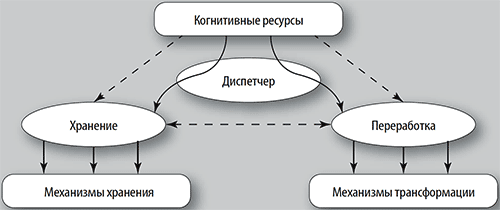Article
Velichkovskiy, Boris B. (2016). The correlation between storage and processing information in working memory. National Psychological Journal. 2, 18-27.
Abstract
Working memory is a major construct in many modern cognitive theories. Defining functions of working memory are storage and processing. This paper provides a study of the problems of correspondence between these functions. It has been figured out that the main difference between these two functions is determined by the following dichotomy: independence/dependence of storage and processing. In the context of stimuli and time correlation studies, these two functions are closely related and based on sharing a common non-specific resource. Studies that analyze resource switching and also correlated and isolated functioning of working memory presuppose some independence between storage and processing. It has been mentioned that this assumption requires some specialized ‘dispatcher’, providing an optimal switching between storage and processing with respect to current contextual limits.
Empirical approaches to the study of storage-processing correspondence are analyzed. Based on this analysis, it is concluded that (1) storage and processing depend on unspecific cognitive resources, (2) storage and processing are realized independently from each other; and (3) storage and processing interact on the basis of the switching of resources via a specialized mechanism. The results can be used in the development of working memory models and for the extension of current ideas about the realization of operative storage and processing.
Accepted: 06/12/2016
Pages: 18-27
DOI: 10.11621/npj.2016.0202
PDF: Download
Keywords: working memory; information processing; resource sharing; storage; resource switching; attention;
Available Online 30.08.2016
Figure 1. Interaction between storage and processing in working memory based on the strategy of an optimal resource switching (unbroken line – mandatory links, broken line – optional links)

Resources:
Ackerman, P.L., Beier, M.E., Boyle, M.O. (2005) Working memory and intelligence: the same or different constructs? Psychological Bulletin. 131, 30-60.
Baars, J. (2005) Global workspace theory: Toward a cognitive neuroscience of human experience? Progress in brain research. 150, 45-55.
Baddeley, A. (1986) Working memory. Oxford, Oxford University Press.
Baddeley, A. (2012) Working memory: Theories, Models, and Controversies. Annual Review of Psychology. 63, 1-29.
Barrouillet, P., & Camos, V. (2007) The time-based resource-sharing model of working memory. The cognitive neuroscience of working memory. Oxford: Oxford University Press. 59-80.
Cowen, N. (1999) An embedded-processes model of working memory. Models of Working Memory. Mechanisms of active maintenance and executive control. Cambridge, Cambridge University Press. 62-101.
Belova, A.P., & Malikh, S.B. (2013) The nature of individual differences in working memory. Theoretical and Experimental Psychology [Teoreticheskaiya i eksperimental’naiya psikhologiya]. 6, 54–64.
Daneman, M., & Carpenter, P.A. (1980) Individual differences in working memory and reading. Journal of Verbal Learning and Verbal Behavior. 19, 450-466.
Daneman, M., & Tardiff, T. (1987) Working memory and reading skill re-examined. Attention and Performance. NY, Erlbaum. 491-508.
Duff, S., & Logie, R. (2001) Processing and storage in working memory span. The quarterly journal of experimental psychology. 2001. 54, 31-48.
Engle, R., & Kane, M. (2004) Executive attention, working memory capacity, and a two-factor theory of cognitive control. The psychology of learning and motivation. NY, Academic Press. 145-199.
Fodor, J. A. (1983) Modularity of Mind: An Essay on Faculty Psychology. Cambridge, Mass., MIT Press.
Kaneman, D. (2006) Attention and effort. Moscow, Smisl.
Luriya, A.R. (2003) The basics of neuropsychology. Moscow, Academia.
Maehara, Y., Saito S. (2007) The relationship between storage and processing in working memory span: not two sides of the same coin. Journal of Memory and Language. 56, 212-228.
Naisser, U. (1981) Cognition and reality. Moscow, Progress.
Navon, D. (1984) Resources – a theoretical soupstone? Psychological Review. 91, 216-234.
Oberauer, K. (2009) Interference between storage and processing in working memory: Feature overwriting, not similarity-based competition. Memory & Cognition. 37. 346-357.
Oberauer, K. (2013) The focus of attention in working memory – from metaphors to mechanisms. Frontiers in Human Neuroscience. 7, 673.
Pogozhina, I. N. (2015). Determination of cognitive development: postnonclassical theoretical model. National Psychological Journal [Natsional’nyy psikhologicheskiy zhurnal]. 3 (19), 35-44.
Shah, P., & Miyake, A. (1996) The separability of working memory resources for spatial thinking and language processing: An individual differences approach. Journal of Experimental Psychology: General. 125, 4-27.
Towse, J. & Hitch, G. (1995) Is there a relationship between task demand and storage space in tests of working memory capacity? Quarterly Journal of Experimental Psychology. 48, 108-124.
Towse, J. Hitch, G., & Hutton, U. (1998) A reevaluation of working memory capacity in children. Journal of Memory and Language. 39, 195-217.
Turner, M., & Engle, R. (1989) Is working memory capacity task dependent? Journal of Memory & Language. 1989. 28, 127-154.
Waters, G., & Caplan, D. (1996) The measurement of verbal working memory capacity and its relation to reading comprehension. Quarterly Journal of Experimental Psychology. 49, 51-79.
Velichkovskiy, B.B. (2014) Correlative dependencies between the results of various tasks targeted at testing working memory. Moscow University Journal. Psychology. [Vestnik Moskovskogo Universiteta. Seriya 14. Psikhologiya]. 4, 18–32.
Velichkovskiy, B.B. (2014) Working memory testing: from the easiest to the hardest and back to the easiest again. Theoretical and Experimental Psychology [Teoreticheskaiya i eksperimental’naiya psikhologiya]. 2, 133–142.
Velichkovskiy, B.B., Nikonova E.Yu., Rumyantsev M.A. (2015) Working memory structure: the effects of data expansion, processing complication and interferences. Psychological Journal [Psikhologicheskiy zhurnal]. 3, 38–48.
For citing this article:
Velichkovskiy, Boris B. (2016). The correlation between storage and processing information in working memory. National Psychological Journal. 2, 18-27.


